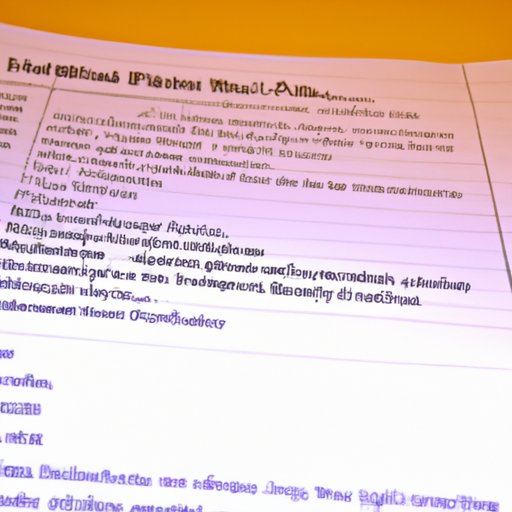Introduction
A Health Savings Account (HSA) is a tax-advantaged savings account that can be used to pay for qualified medical expenses. It is available to people who are enrolled in a High Deductible Health Plan (HDHP). With an HSA, you can save money on taxes while also saving for healthcare expenses now and in the future.
Overview of Benefits
The main benefit of an HSA is that it allows you to save money on taxes by reducing your taxable income. Contributions to an HSA are tax-deductible, and you will not owe taxes on withdrawals for qualified medical expenses. Additionally, HSAs provide flexibility in how you use the funds. You can use them to pay for current medical expenses as well as save for future healthcare costs.

How to Set Up a Health Savings Account
In order to set up an HSA, you must first be enrolled in an HDHP. You must also be under the age of 65, not be claimed as a dependent on anyone else’s tax return, and not be enrolled in Medicare or any other health insurance plan that is not an HDHP. Once these requirements have been met, you can begin the process of opening an HSA.
The required documentation for opening an HSA varies from bank to bank, but typically includes proof of identity, proof of address, and proof of insurance. Once the paperwork has been completed, you can establish an account with a bank or other financial institution. The amount you can contribute to an HSA each year is limited by the IRS, so it is important to familiarize yourself with the rules before opening an account.
What Can Be Covered with a Health Savings Account
HSAs can be used to cover a variety of qualified medical expenses, including doctor’s visits, prescription drugs, dental care, vision care, and more. In addition to covering current medical expenses, HSAs can also be used to save for future healthcare costs. Funds in an HSA can be invested, allowing them to grow over time.
HSAs offer several tax advantages. Contributions to an HSA are tax-deductible, and withdrawals for qualified medical expenses are not subject to federal income tax. Additionally, funds in an HSA can be rolled over from year to year, allowing you to save for future healthcare costs without having to pay taxes on the money.
The Difference between a Health Savings Account and an FSA
A Health Savings Account is often confused with a Flexible Spending Account (FSA). Both accounts offer tax advantages and can be used to pay for qualified medical expenses, but there are some key differences between the two.
An FSA is an employer-sponsored account that allows employees to set aside pre-tax dollars to cover certain medical expenses. Funds in an FSA are “use it or lose it”, meaning that any money left in the account at the end of the year will be forfeited. By contrast, funds in an HSA can be rolled over from year to year, allowing you to save for future healthcare costs.
Additionally, contributions to an HSA are not limited by an employer. An employee can contribute up to the annual contribution limit set by the IRS, regardless of their employer’s contribution. This makes HSAs a more attractive option for those looking to save for future healthcare costs.

Tips for Maximizing Your Health Savings Account
When using an HSA, there are several steps you can take to maximize its potential. First, take advantage of any employer contributions. Many employers offer matching contributions, which can help you build up your account faster. Additionally, keep track of your contributions and expenses to ensure that you are staying within the limits set by the IRS.

Exploring Investment Options in a Health Savings Account
One of the biggest advantages of an HSA is the ability to invest the funds. Investing in an HSA can allow your money to grow over time, giving you access to larger sums of money when it comes time to pay for medical expenses. However, there are some rules and restrictions that must be followed when investing in an HSA. For example, investments must be approved by the custodian of the HSA, and all transactions must comply with IRS regulations.
Strategies for Using a Health Savings Account for Retirement Planning
Because of its tax advantages and flexibility, an HSA can be a powerful tool for retirement planning. When combined with other retirement savings vehicles such as 401(k)s and IRAs, an HSA can provide additional tax benefits and help you build a larger nest egg for retirement. Additionally, funds in an HSA can be used to pay for qualified medical expenses in retirement, helping to offset the cost of healthcare.
Conclusion
A Health Savings Account is a great way to save money on taxes while also preparing for future medical expenses. With an HSA, you can take advantage of tax deductions, invest the funds, and use the money to cover medical expenses both now and in retirement. By taking the time to understand the rules and regulations, you can make the most of your HSA and reap the benefits it offers.
(Note: Is this article not meeting your expectations? Do you have knowledge or insights to share? Unlock new opportunities and expand your reach by joining our authors team. Click Registration to join us and share your expertise with our readers.)
